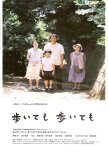After the death of his mother, whom he had nursed for years, Director Kore-eda Hirokaze offered up Still Walking (Aruitemo, Aruitemo/"Even if You Walk and Walk") as something of a tribute. This film was ultimately inspired by nostalgic bedside talks with her, and embodies the feeling of such intimacy with deep affectation. Should one be a fan of understated human drama, the director alone, or Japanese cinema in general, take notice of this fine masterwork. You should not miss it for the world.
Still Walking centers on a particular day in the life of an ordinary Japanese family. While they try to maintain a semblance of normalcy on this day, the occasion cannot allow it to be wholly so. It is the memorial of a tragic death, and so even the most errant of relatives have come to call.
The story is told through beautifully written, but realistic conversations and domestic interactions between characters. While they cook, play, eat, or chat together, the dynamics between them slowly but surely unfold. We see fondness, pain, nostalgia, resentments, and all manner of feeling bubble to the surface. But none of this is done in the usual bombastic way, lending the entire piece more relatability than one might first imagine. It’s all very Japanese, but very human as well; how often have you swallowed a hurtful comment or urged yourself to forget it… just because of the ties that bind? I saw parts of my own family in Still Walking, little bites of conversation I've spoken myself. It leaves one with much to think about.
My chief issue would be that, while slow films rarely bother me, this takes a little *too* long to launch. Still Walking requires the viewer to see every minute to feel its effects to the highest measure. The ending also feels a little incomplete, but that can be overlooked; Still Walking is meant to portray life continuing under the cloud of death. We don’t always get perfect conclusions in real life, do we?
Calling out a particular actor or actress for an exemplary performance would be difficult. The entire ensemble works together so well they give the solid impression of an actual family, bitterness, warmth, and all. If forced to choose, Abe Hiroshi might win as the most easily recognizable among them; much of Still Walking focuses on his Ryota, and he’s arguably representative of Kore-eda himself. Kiki Kirin is also remarkable as Toshiko, the talkative and smiling mother who hides her many battle-scars behind polite words. She sometimes reminded me of my own mother, which was a little jarring.
A particular piece of music that sticks with me after completion is Blue Light Yokohama (Ishida Ayumi). If one has never "heard" nostalgia, this song will change that. Despite being quite the “oldie,” its inclusion is just exquisite. Common sounds are used effectively also; such as overlapping talk, popping and sizzling in the kitchen, etc.
Please note the interesting shots used in Still Walking. Detail in them is astounding, from hallways to individual rooms. The cinematography here lends an air of tranquility, of reality, of home…. My weak powers of description are not enough to describe the effect. One must truly see it for themselves.
Was this review helpful to you?























